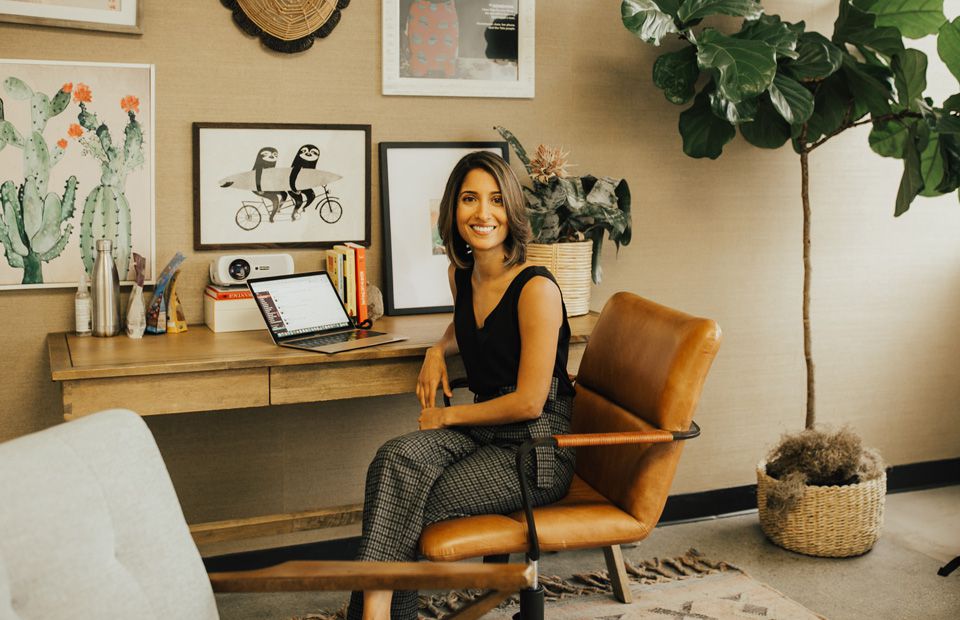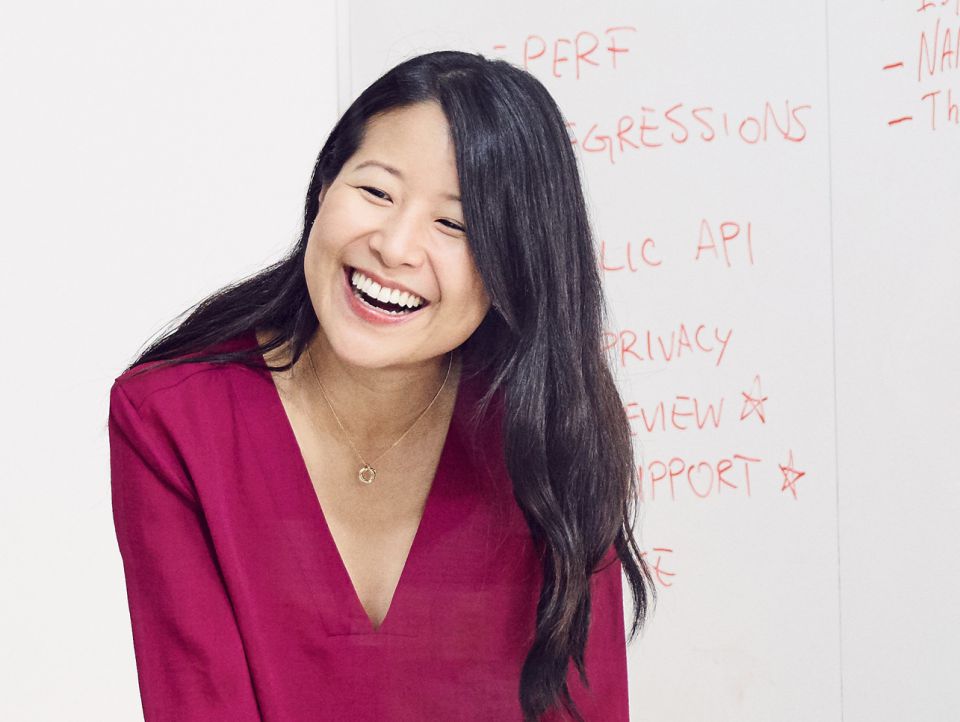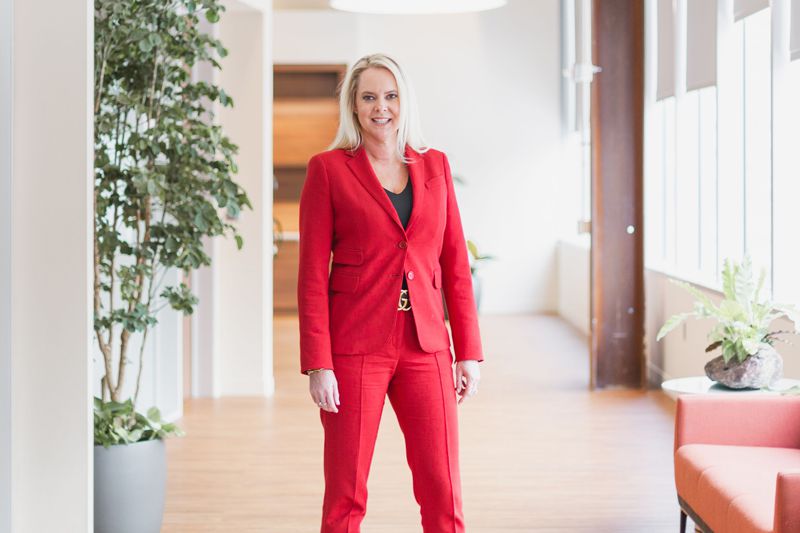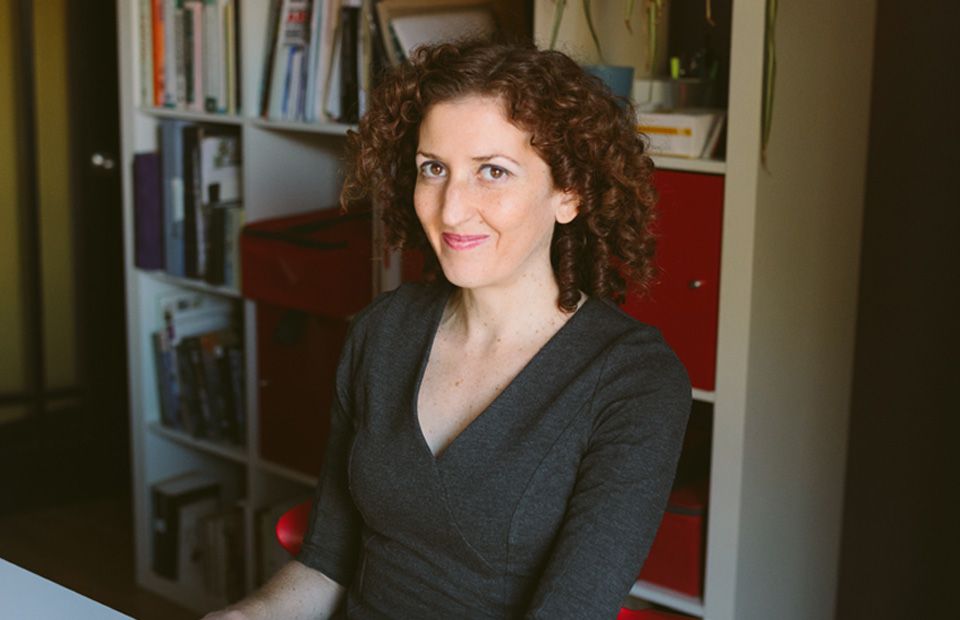Kimberly Koretoff’s career success as an occupational therapist is, in part, due to something so simple, yet so often underrated: kindness. She initially was drawn to the therapeutic industry because she wanted to improve the lives of people with disabilities—helping them complete the simple tasks that we so often take for granted, like tying shoes or walking. Working as an occupational therapist at her own clinic, OT 4 Kids & The Therapeutic Learning Center, has proven to be amazingly rewarding for Kimberly as she witnesses her patients go from not being able to sit up, to crawling, to walking—and all of the little baby steps in between.
While at work, Kimberly puts her full range of skills to use—empathy, sympathy and patience—as she helps parents navigate the emotional world of children with disabilities. She admits that it’s not easy, but for Kimberly, one of the most important things to remember is that she’s helping her patients make small movements towards a better life.
Over the years, Kimberly has learned to put herself in the shoes of others—namely the parents who are dealing with a disabled child—in order to understand each case on a deeper level. Today, Kimberly is working towards her doctorate and is striving to make occupational therapy more accessible for those in need.
Her Starting Point
You double majored in Occupational Therapy and Communications at USC. How were both of those degrees useful as you were starting your career? What sparked your interest in the health industry? When did you feel like this was the right path for you?
I began my undergraduate education at USC planning to enter into marketing and advertising and thus, majored in communication. However, it was not until I had finished my degree that I realized my passion really belonged to the health sciences. I had always been interested in the health sciences and became very attracted to the job flexibility a career in the health professions would offer. My dream is to have a large family one day, and I understand how difficult it will be to work full-time and to raise a family full-time in a career that does not allow for part-time employment.
I knew from the first OT class I had taken at USC that it was the right career choice for me. There were so many different career choices working with such a wide variety of individuals, that I knew I would never get bored of my career. Being a part of a profession that is constantly changing and growing—and that provided endless possibilities to enhance the lives of others—was a huge plus for me. Not to mention, I knew how rewarding and challenging the job would be, which also sparked my curiosity.
As an OT, I never see the same patient twice and each individual comes from such a unique background that no two stories are ever the same. I am always challenged to push myself and the profession forward, and I find great pride in the vast amount of leadership opportunities within the field.
My communications degree has greatly impacted my ability to connect with others as well as understand market trends and analysis to push my business forward. I understand the importance of creating an image for yourself as well as the value of strong communication and leadership skills to help with interpersonal communication and networking. Receiving an education from one of the top universities in the nation (and the #1 school for occupational therapy) has opened many doors for me. I have access to mentors pioneering the field of OT, and have relationships with individuals testing out the newest and latest forms of treatment. I would not be where I am today without my past educational and career experiences.
Some of our readers may not be particularly familiar with the ins and outs of the Occupational Therapy (OT) industry. What is OT and how does an Occupational Therapist help people?
Occupational therapists work with people across the lifespan to address any physical, emotional or cognitive deficits and/or disabilities. We work closely with physical and speech therapists and focus on functional outcomes from our clients. I specialize in pediatrics and work with children who have a variety of different diagnoses, such as feeding and eating difficulties, Autism and Aspergers, Cerebral Palsy, Down Syndrome, prematurity, sensory processing disorders and many, many more.
An occupational therapy helps individuals to live life to the fullest, by using the person’s strengths to address their weaknesses. Through occupational engagement (meaningful activities) an OT helps their clients to regain function and participate in daily activities. For adults with moderate to severe disabilities, this may include wheelchair training, handicap accessibility, use of adaptive equipment, dressing, grooming and hygiene tasks, return to driving, return to work and the ability to participate in any meaningful activity—from yoga, to playing the guitar.
Children’s main occupations are school, play and socialization with their peers. It is for that reason that we often focus on their gross motor, fine motor, motor coordination, bilateral skills, visual processing and sensory processing abilities to determine where they may be having any difficulties. Occupational therapists specialize in a variety of fields—from health and wellness, to mental health, pediatrics, geriatrics and home health, ergonomics and return to work, school-based therapy, and inpatient acute and outpatient rehabilitation.
After graduation, you briefly worked in behavioral therapy. How has occupational therapy been similar or different from that experience?
Working in behavioral therapy had given me great experience and exposure to children on the Autism spectrum. Sessions were typically held within the child’s home, and you therefore gain a better understanding of the home dynamics and how a child’s difficulties effect the entire family.
I frequently use behavioral tactics and strategies in my occupational therapy sessions, however, the theoretical backgrounds are very different. Occupational therapists work closely with the child’s behaviorists and each professional communicates to ensure the same language is used with the child for continuity and greater carryover at home. I am thankful for the exposure and training I received from being a behavioral therapist as I am better able to communicate with other professionals and support staff, and feel comfortable recommending specific behavioral strategies to parents.
What were your next steps after graduation? How did you get your OT career started?
After graduation, I studied extensively for my board exams to get my license to practice. Once I had received my license, I applied for my first job at Los Angeles Unified School District. I was attracted to the idea of being on a school schedule with time off for vacations to travel and/or teach abroad. However, I always knew my true passion belonged to the clinics. I had applied to a Per Diem position over the summer break at a small private pediatric practice in Santa Monica, and the owner offered me a full-time position. I knew this was the right choice for me and sadly gave my two-weeks’ notice to LAUSD.
I could not imagine the amount of clinical and professional growth I would see over the next two years at the clinic. I have worked towards my specialty certification in sensory integration (SIPT Certification), and am making steady progress towards my feeding, eating and swallowing advanced practice certification (SWC). Working in the clinic setting has given me exposure to a much wider population of children, with the youngest I’ve worked with being five months and the oldest being 17 years. I never stop researching, learning and pushing myself to be a better therapist, and I welcome the challenge the clinic environment presents.
Her Big Break
Tell us about the process of opening your own OT business? What were the first steps you took, and what resources did you use? What was your marketing strategy for securing clients, etc.?
I have been extremely lucky in my career thus far. The previous owner has lived out of the state, and therefore gave me the opportunity to run and manage her clinic when she was not present (highly unlikely opportunity for a new graduate). Everything I know, I had to learn on the job, as I had had no previous administration or managerial experience. I purchased the clinic from the previous owner and was lucky to have had the experience of running and managing the clinic with her guidance. This allowed me to learn from my mistakes and make daily improvements for the future success of the clinic.
I am blessed to have a large support group, with mentors from the university, my family (who previously owned a medical practice) and a close working relationship with Andree James, a speech therapist and business owner whom I share our current space with. I also hired an extremely educated lawyer and CPA who helped with setting up the financials and legalities of the business operations.
Since I had been running the practice for some time, the majority of our clients were familiar with the business and myself. During the transition, we did not lose a single client. I made it a priority to assure each family that I would continue to be there for them and would continue to be a part of their child’s therapy program.
Today, my strategy for securing clients is to first get them in the door. We house a beautiful, state-of-the-art treatment facility and we are one of the few private clinics in west LA to accept insurance. Medical costs quickly add up for families with special needs children, and I believe it is our duty to offer therapy to as
many individuals as possible. I also maintain close working relationships with pediatricians, psychologists and school directors in the community who frequently refer children to our facility.
How does OT 4 Kids work? What are your daily tasks and responsibilities? How many hours do you put into your job daily?
Each client is assigned to a therapist who will best suit their therapeutic needs, and then they are scheduled with their therapist on an ongoing basis. I could not imagine leaving the treatment side of the business, as that is the reason I entered the profession in the first place, which is why I maintain roughly 18 to 20 treatment hours in addition to my administration and managerial tasks.
My daily roles include mentoring my other therapists, treatment planning for my own caseload as well as for other therapists’ caseloads, completing daily treatment notes, progress reports and evaluations, calling physicians and insurance companies, collaborating with the child’s support staff (speech therapist, behaviorist, physical therapist, teacher, etc.), emailing families and case managers, scheduling, billing, marketing, educating volunteers and students who are completing their clinical hours, maintaining the clinic (cleaning, purchasing materials, repairs, etc.), tracking financials and settling my accounts, motivating my therapists to seek new professional development roles, program development and human resources.
I typically put in 10 to 12 hour days and am available to my families and therapists 24/7. Occasionally, I will take a weekend or a Sunday off for personal time, however this has become less and less of an option as I am running a growing business!
We imagine that working with children can, at times, be both stressful and emotional. What are your strategies for remaining calm and focused when working with parents and kids?
I tend to take a very optimistic approach when working with our families. Yes, at times it can be very emotional, but I always think that I am benefiting the child and family in some way and am working to give both the child and family a better life. Patience is a virtue in this profession, as well as self-forgiveness. Understanding that you are not here to “fix” the child, but rather provide them with the tools to live a more functional life alleviates the pressure and stress behind the job. Through play, we can achieve wonderful progress.
Often times, it is more challenging working with the parents than the actual child. However, I know that if my child were receiving treatment, I would be completely and wholly involved and would want the utmost best for them. Taking the parents’ perspective into account helps me to remain calm and focused, and it also allows for empathy and understanding.
How have OT technology and equipment changed, if at all, since you began your career?
There is a much larger emphasis on adaptive technology and “apps” since starting my OT career. The amount of educational apps to address fine motor, visual motor, letter and number identification and cognitive processing continues to amaze me. Not to mention the apps now available for communication and speech therapies. There also have been increases in using technology for older adults, such as gaming systems like Wii to address balance and coordination. The possibilities are endless!
What has been the most rewarding thing about working in occupational therapy? Can you tell us about a recent success story?
Every day is rewarding. I play for a living and, while doing so, impact children and families for the better. I have seen children who cannot eat and are off the growth chart due to malnutrition leave the clinic eating a sandwich. Or the child who gets motion sickness from a car ride be able to ride a roller coaster on their birthday. Families who are at a loss as to what to do with their child’s disability, feel empowered and supported by their community.
I have success stories every day, but my most recent includes a boy named Benjamin. When I first started working with Benjamin he was 10 months old and could not sit up on his own (typical developmental milestone is five to six months sitting unassisted). Through occupational therapy, we addressed his decreased muscle tone, poor postural control, decreased overall body strength and decreased motor planning skills as he progressed from sitting, to crawling and then to standing. He graduated two months ago and I knew he was ready when he was able to run out the door and jump with two feet on a large trampoline without any assistance.
Her Perspective
What is a misconception you've heard about occupational therapy? What attitude or action do you wish you could change?
A perspective I would want to change is that, if a child is already receiving physical therapy, they do not need OT. This may be correct, however, often times there is more going on within an individual’s body—such as poor sensory processing and integration of their sensory systems—which, in turn, affects their motor coordination and motor skills.
If your child is referred to occupational therapy by their physical or speech therapist, I highly recommend following up with that recommendation to ensure every aspect of the child is accounted for when analyzing their movement patterns and skill level. A comprehensive team comprised of a physical therapist, occupational therapist and speech therapist is ideal for continuous collaboration where everyone is able to work towards a shared goal and pull from a wide variety of practice frameworks for the best results.
You returned to school and are currently working on your doctorate while simultaneously directing OT 4 Kids. What are the professional benefits of a doctorate degree? How do you handle work/life balance?
Working towards my doctorate degree has been one of the most rewarding experiences of my career thus far. It has put me in touch with the best professionals in the industry and I have had the opportunity to seek mentorship from one of the leading pioneers in the occupational therapy profession. I have been given opportunities to complete research and I hope to one day become published. It also has provided me with leadership opportunities and the ability to receive advanced practice certifications in sensory integration.
In order to continue to progress within the profession, occupational therapy needs leaders willing to go above and beyond for the overall betterment of the business. I am extremely thankful for my education thus far, and am delighted at the opportunity to continue my professional development through the doctorate program at USC.
USC has a great Occupational Science and Occupational Therapy alumni group. What other resources have been useful to you in your career?
Occupational therapy is a small profession where everyone seems to know everyone. Networking and socializing with other therapists, as well as other rehabilitation specialists (i.e. speech and physical therapy), has been very useful for continuing education, referrals and collaboration purposes. I also have found that attending the annual occupational therapy conferences has been a great way to meet other professionals in the field and learn from their hard work.
And finally, what do you wake up looking forward to? What’s next for your career?
I wake up looking forward to the challenge. I believe in this profession and my clinic, and hope to be able to serve a wider variety of clients and their families. I am always brainstorming new treatments and programs to offer to our families, as well as working towards securing new funding sources to allow for increased profit and affordability on my client’s end. I also hope to open a few other clinics in the surrounding Los Angeles and Orange County areas. There are many underserved areas lacking in quality therapy clinics, and therefore, I hope to bridge the gap and expand my skills to help more people.
You May Also Like

Technology
A Tech Founder on Why Being an Outsider Is a Strength
"I actually think most successful founders are rebels, of a sort. We’re trying to do new things and take on entrenched systems or ways of thinking. What makes me and our company different is that we’re outsiders."

Technology
Omoju Miller—Tech Veteran, Leader, and Volunteer Advisor to the Obama Administration—on The Crucial Role of Creativity in the Tech Industry
"If you are in an environment where you feel marginalized, leave. Don’t try to change it. Go and look for a place that sees you and lets you be you."

Technology
Sharing Stories as a Software Engineer
We sat down with Apple software engineer Emilie to learn about her day-to-day working at Apple along with what it takes to run the perfect meeting and her favorite ways to unwind.

Technology
Creating Impact with Apple
We sat down with Apple's Senior Developer Partner Relations Advisor, Cris, to learn about what it takes to create a lasting impact within a large company. She shares a typical day in the life, her favorite book recommendations, and her top four tips to running a meeting.

Technology
Salesforce’s Senior Vice President of Sales on Unconscious Bias, Failure, and Innovative Leadership
"Do not be afraid to fail, just bring your best self to the table."

Technology
A Director of Engineering on Tech + Leadership
"I don’t believe in 'having it all'. If you spend more time on one thing, then you spend less time on another thing. All we can do is make choices on how to spend our time."
Get the Best Career Advice Delivered To Your Inbox
Join our newsletter to stay in the loop.
